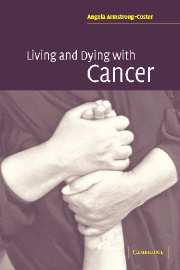2 - Stage One – Departure
Published online by Cambridge University Press: 22 September 2009
Summary
Symptoms, consultations and diagnoses
When I began this series of interviews, I was at first surprised by how almost all of those who were telling me their stories anchored their narratives by recollecting the discovery of their original symptom. This was the pattern, irrespective of the time that had elapsed. Although from the moment of birth everyone is dying; for most, that knowledge is disregarded until they are confronted in a direct encounter with death. This section charts the initial movement on the journey that eventually led through the respondents' physical decline and on to their deaths. It begins at the time when they were, unknowingly, just moments away from detecting their first symptom. This was a point in their lives when they felt secure and safe, substantial and complete in their physical bodies. This feeling of ontological security was, however, about to be challenged.
Exploring how bodily changes were defined as problematic by them and others, this chapter investigates the objective and subjective reactions to those changes and examines how others, their supporters, contributed to these experiences. It continues, examining how they dealt with the medical professionals involved and concludes by examining how the interviewees responded to discovering their diagnoses.
As biological beings, our bodies are constantly changing. For the most part, these changes are acknowledged and accepted as part of our normal development as, other than at puberty, these changes occur so gradually that they receive scant notice or comment.
- Type
- Chapter
- Information
- Living and Dying with Cancer , pp. 16 - 50Publisher: Cambridge University PressPrint publication year: 2004



